Презентация presentation united kingdom

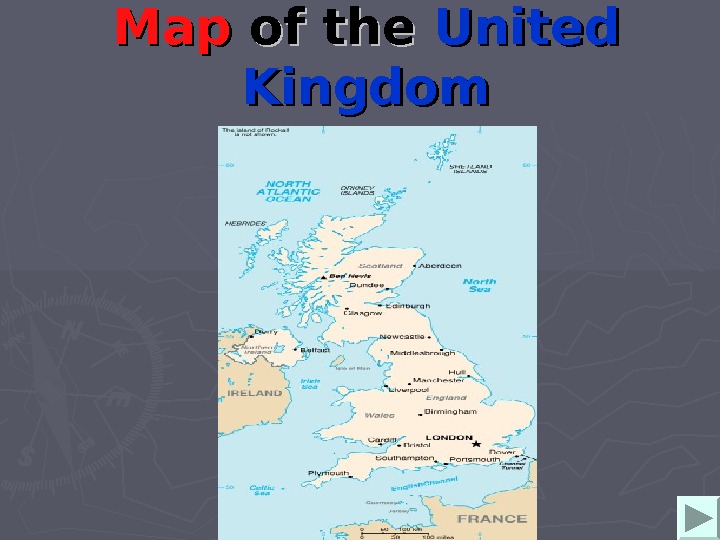
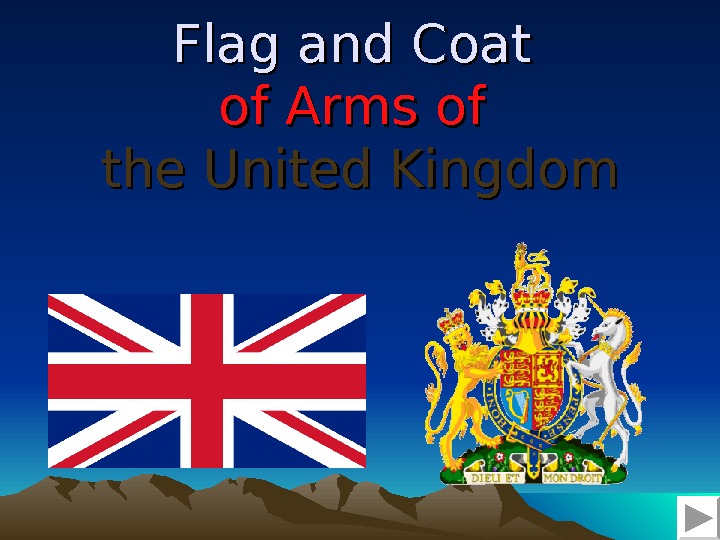
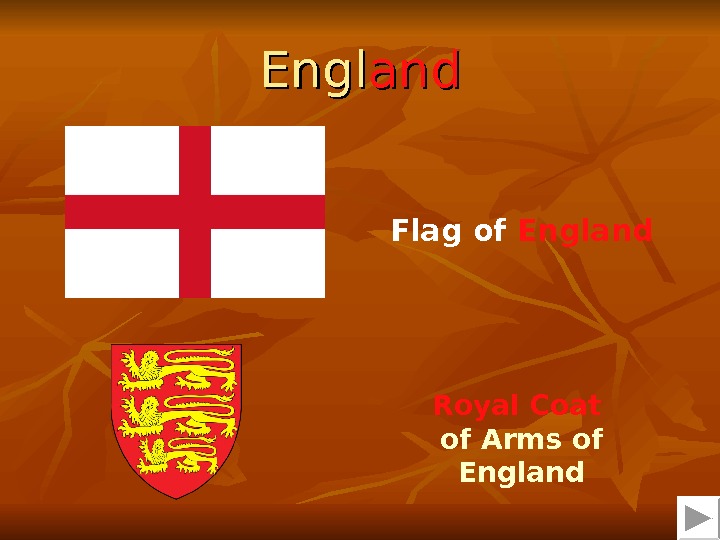
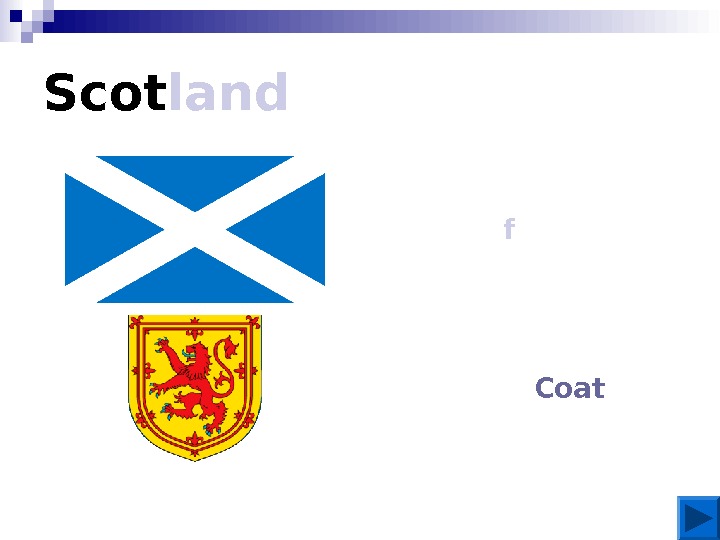
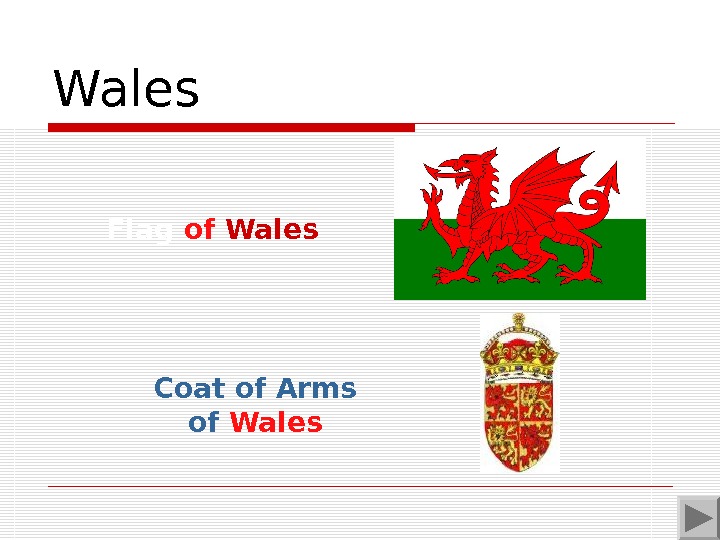
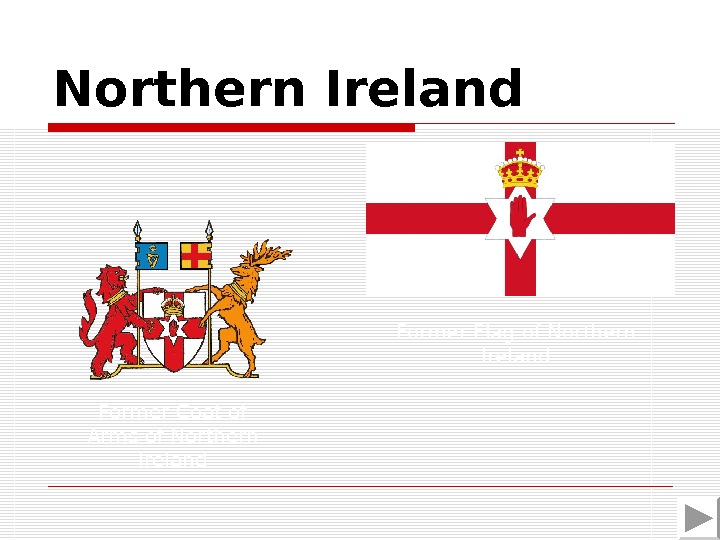
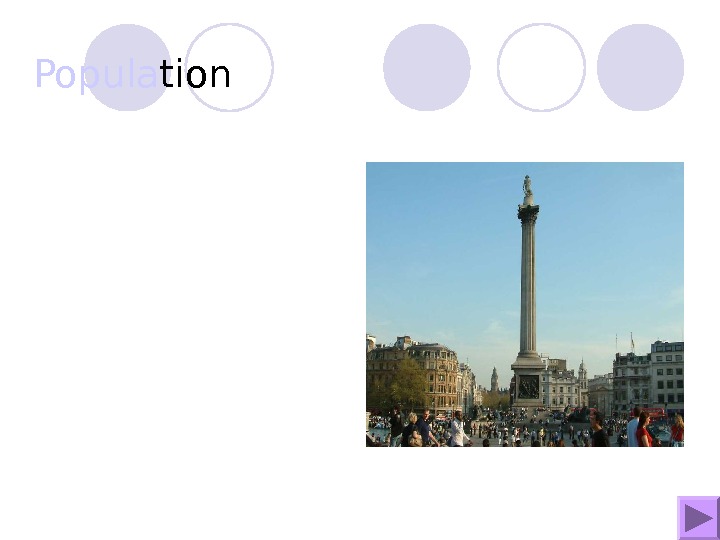
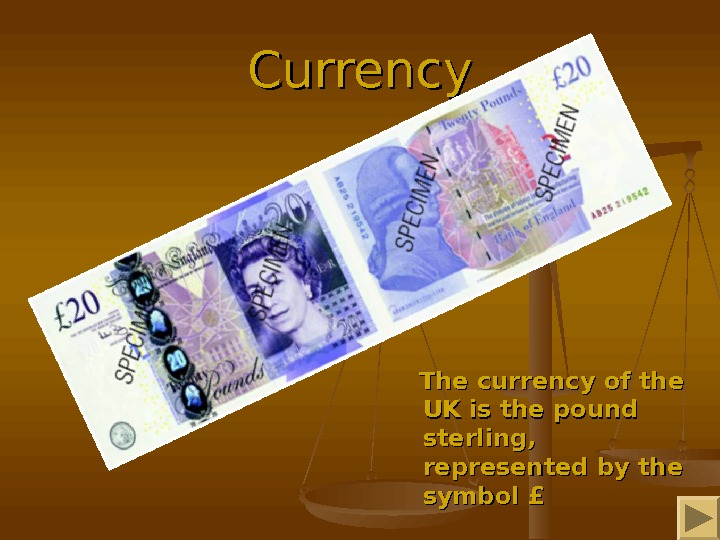
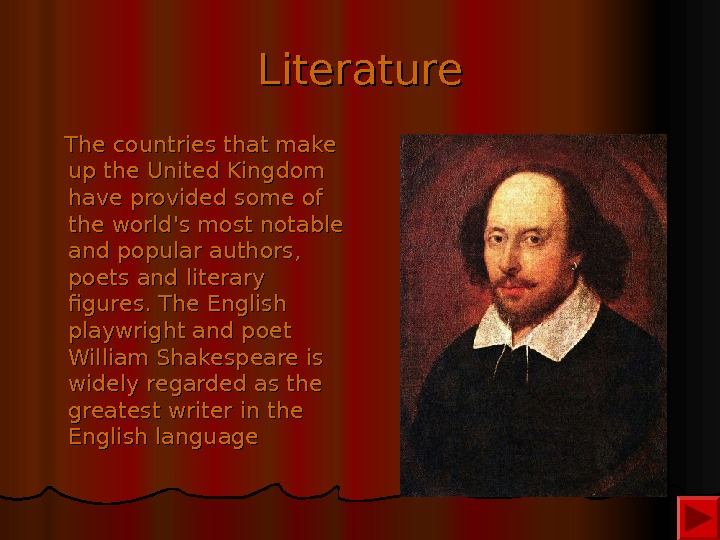

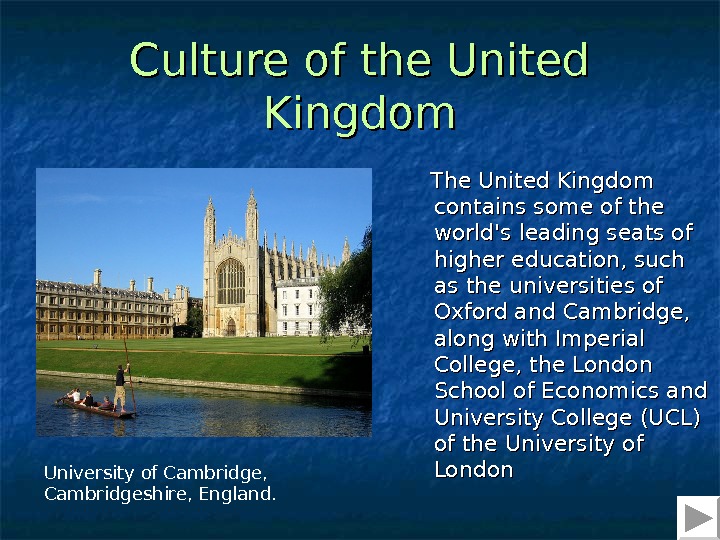
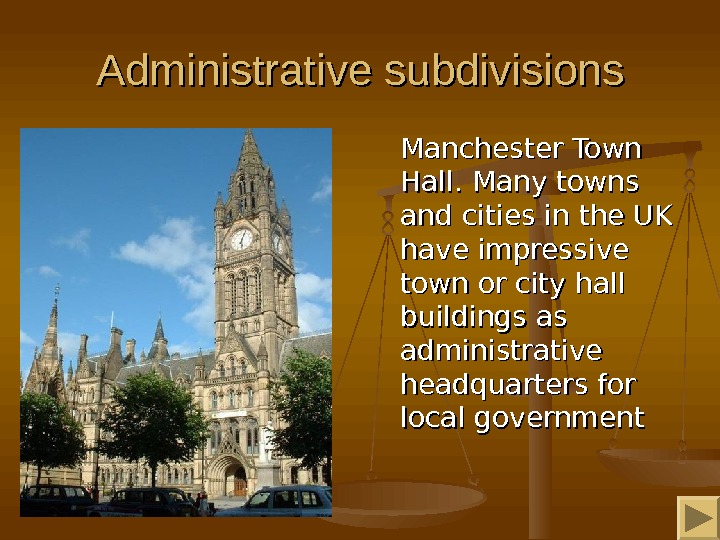
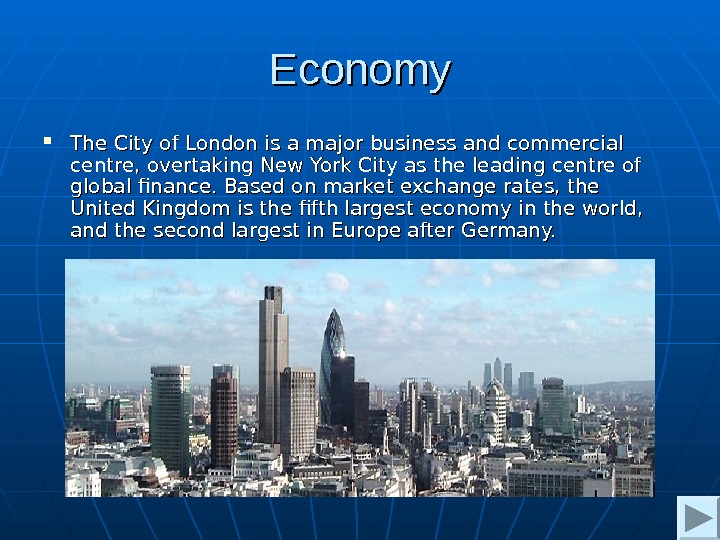
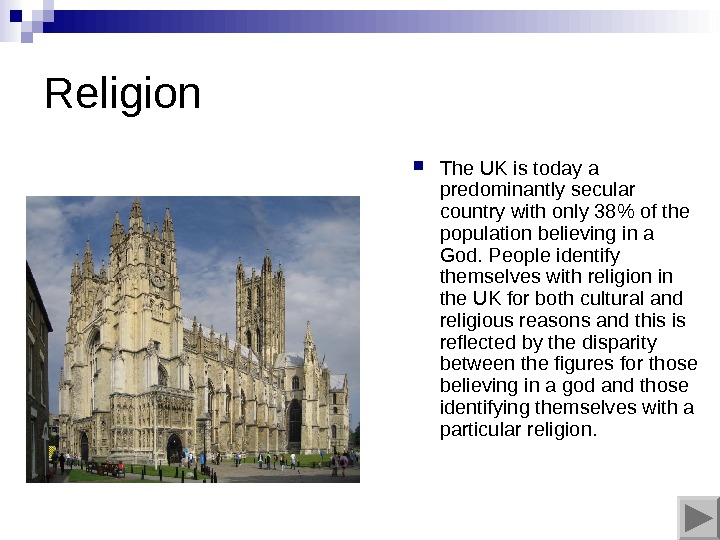
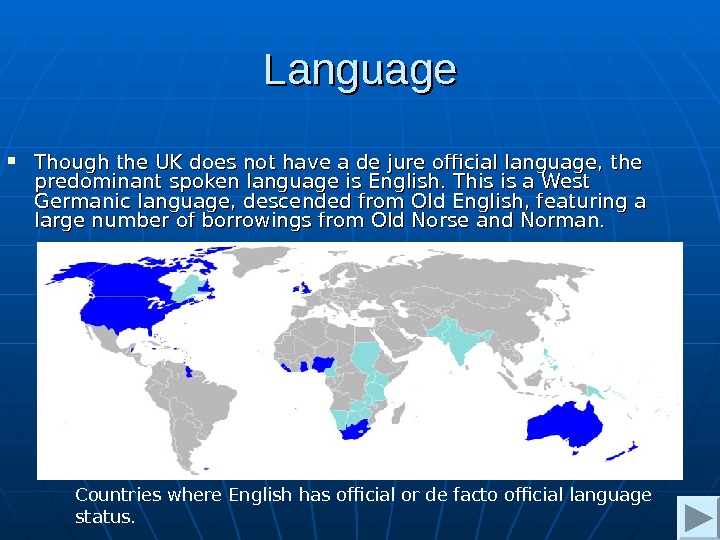
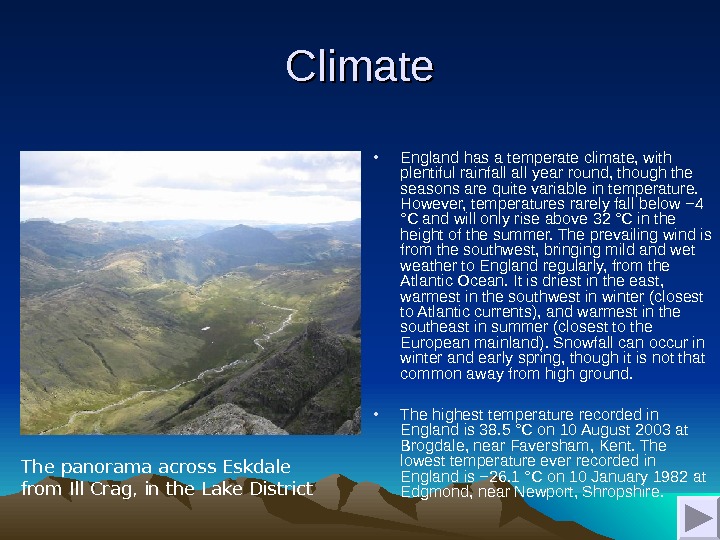
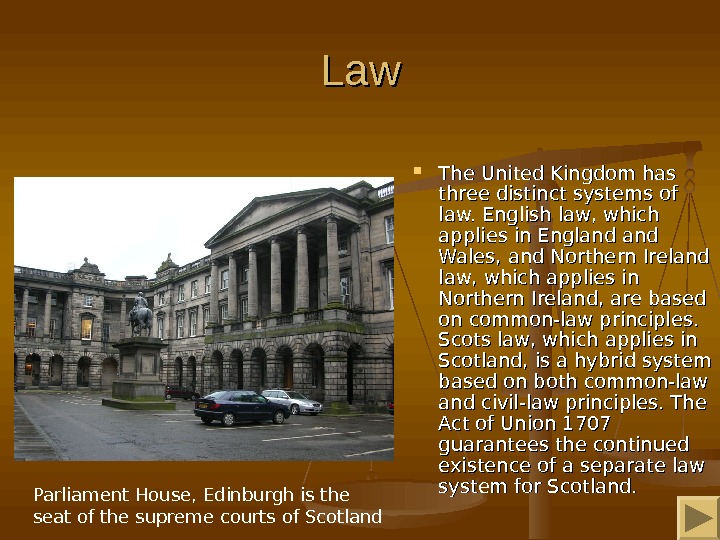
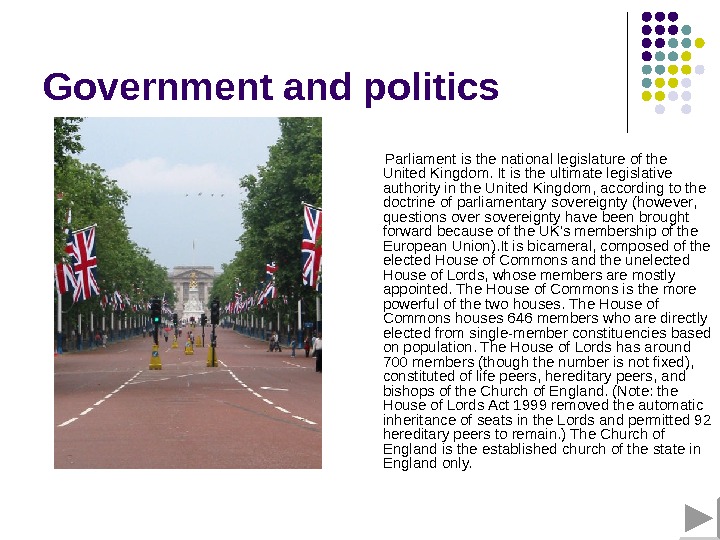
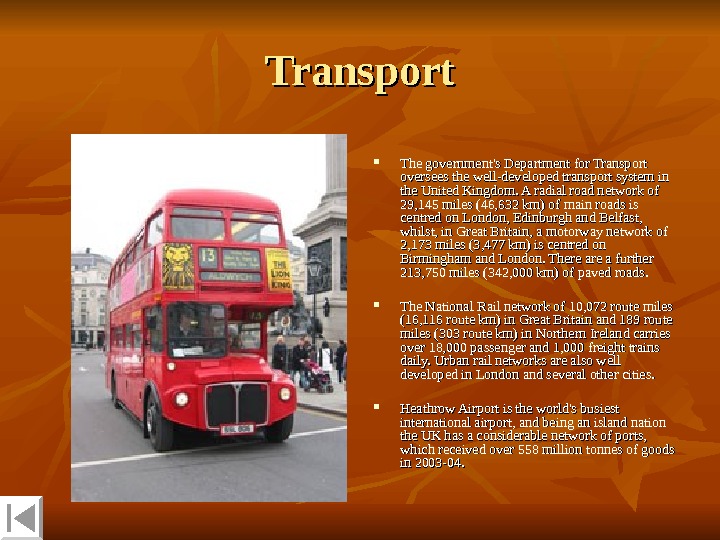
- Размер: 4.2 Mегабайта
- Количество слайдов: 19
Описание презентации Презентация presentation united kingdom по слайдам
 Map of the United Kingdom
Map of the United Kingdom
 Flag and Coat of Arms of the United Kingdom
Flag and Coat of Arms of the United Kingdom
 Engl andand Royal Coat of Arms of England. Flag of England
Engl andand Royal Coat of Arms of England. Flag of England
 Scot land Flag o f Scotland Royal Coat of Arms of Scotland
Scot land Flag o f Scotland Royal Coat of Arms of Scotland
 Wales Flag of Wales Coat of Arms of Wales
Wales Flag of Wales Coat of Arms of Wales
 Northern Ireland Former Flag of Northern Ireland Former Coat of Arms of Northern Ireland
Northern Ireland Former Flag of Northern Ireland Former Coat of Arms of Northern Ireland
 Popula tion Trafalgar Square in London is one of the most famous public places in the United Kingdom. At the April 2001 UK Census, the United Kingdom’s population was
Popula tion Trafalgar Square in London is one of the most famous public places in the United Kingdom. At the April 2001 UK Census, the United Kingdom’s population was
 Currency The currency of the UK is the pound sterling, represented by the symbol £
Currency The currency of the UK is the pound sterling, represented by the symbol £
 Literature The countries that make up the United Kingdom have provided some of the world’s most notable and popular authors, poets and literary figures. The English playwright and poet William Shakespeare is widely regarded as the greatest writer in the English language
Literature The countries that make up the United Kingdom have provided some of the world’s most notable and popular authors, poets and literary figures. The English playwright and poet William Shakespeare is widely regarded as the greatest writer in the English language
 Sport The Wimbledon Championships are international tennis events held in Wimbledon in south London every summer and are regarded as the most prestigious of the tennis calendar.
Sport The Wimbledon Championships are international tennis events held in Wimbledon in south London every summer and are regarded as the most prestigious of the tennis calendar.
 Culture of the United Kingdom The United Kingdom contains some of the world’s leading seats of higher education, such as the universities of Oxford and Cambridge, along with Imperial College, the London School of Economics and University College (UCL) of the University of London University of Cambridge, Cambridgeshire, England.
Culture of the United Kingdom The United Kingdom contains some of the world’s leading seats of higher education, such as the universities of Oxford and Cambridge, along with Imperial College, the London School of Economics and University College (UCL) of the University of London University of Cambridge, Cambridgeshire, England.
 Administrative subdivisions Manchester Town Hall. Many towns and cities in the UK have impressive town or city hall buildings as administrative headquarters for local government
Administrative subdivisions Manchester Town Hall. Many towns and cities in the UK have impressive town or city hall buildings as administrative headquarters for local government
 Economy The City of London is a major business and commercial centre, overtaking New York City as the leading centre of global finance. Based on market exchange rates, the United Kingdom is the fifth largest economy in the world, and the second largest in Europe after Germany.
Economy The City of London is a major business and commercial centre, overtaking New York City as the leading centre of global finance. Based on market exchange rates, the United Kingdom is the fifth largest economy in the world, and the second largest in Europe after Germany.
 Religion The UK is today a predominantly secular country with only 38% of the population believing in a God. People identify themselves with religion in the UK for both cultural and religious reasons and this is reflected by the disparity between the figures for those believing in a god and those identifying themselves with a particular religion.
Religion The UK is today a predominantly secular country with only 38% of the population believing in a God. People identify themselves with religion in the UK for both cultural and religious reasons and this is reflected by the disparity between the figures for those believing in a god and those identifying themselves with a particular religion.
 Language Though the UK does not have a de jure official language, the predominant spoken language is English. This is a West Germanic language, descended from Old English, featuring a large number of borrowings from Old Norse and Norman. Countries where English has official or de facto official language status.
Language Though the UK does not have a de jure official language, the predominant spoken language is English. This is a West Germanic language, descended from Old English, featuring a large number of borrowings from Old Norse and Norman. Countries where English has official or de facto official language status.
 Climate • England has a temperate climate, with plentiful rainfall year round, though the seasons are quite variable in temperature. However, temperatures rarely fall below − 4 °C and will only rise above 32 °C in the height of the summer. The prevailing wind is from the southwest, bringing mild and wet weather to England regularly, from the Atlantic Ocean. It is driest in the east, warmest in the southwest in winter (closest to Atlantic currents), and warmest in the southeast in summer (closest to the European mainland). Snowfall can occur in winter and early spring, though it is not that common away from high ground. • The highest temperature recorded in England is 38. 5 °C on 10 August 2003 at Brogdale, near Faversham, Kent. The lowest temperature ever recorded in England is − 26. 1 °C on 10 January 1982 at Edgmond, near Newport, Shropshire. The panorama across Eskdale from Ill Crag, in the Lake District
Climate • England has a temperate climate, with plentiful rainfall year round, though the seasons are quite variable in temperature. However, temperatures rarely fall below − 4 °C and will only rise above 32 °C in the height of the summer. The prevailing wind is from the southwest, bringing mild and wet weather to England regularly, from the Atlantic Ocean. It is driest in the east, warmest in the southwest in winter (closest to Atlantic currents), and warmest in the southeast in summer (closest to the European mainland). Snowfall can occur in winter and early spring, though it is not that common away from high ground. • The highest temperature recorded in England is 38. 5 °C on 10 August 2003 at Brogdale, near Faversham, Kent. The lowest temperature ever recorded in England is − 26. 1 °C on 10 January 1982 at Edgmond, near Newport, Shropshire. The panorama across Eskdale from Ill Crag, in the Lake District
 Law. Law The United Kingdom has three distinct systems of law. English law, which applies in England and Wales, and Northern Ireland law, which applies in Northern Ireland, are based on common-law principles. Scots law, which applies in Scotland, is a hybrid system based on both common-law and civil-law principles. The Act of Union 1707 guarantees the continued existence of a separate law system for Scotland. Parliament House, Edinburgh is the seat of the supreme courts of Scotland
Law. Law The United Kingdom has three distinct systems of law. English law, which applies in England and Wales, and Northern Ireland law, which applies in Northern Ireland, are based on common-law principles. Scots law, which applies in Scotland, is a hybrid system based on both common-law and civil-law principles. The Act of Union 1707 guarantees the continued existence of a separate law system for Scotland. Parliament House, Edinburgh is the seat of the supreme courts of Scotland
 Government and politics Parliament is the national legislature of the United Kingdom. It is the ultimate legislative authority in the United Kingdom, according to the doctrine of parliamentary sovereignty (however, questions over sovereignty have been brought forward because of the UK’s membership of the European Union). It is bicameral, composed of the elected House of Commons and the unelected House of Lords, whose members are mostly appointed. The House of Commons is the more powerful of the two houses. The House of Commons houses 646 members who are directly elected from single-member constituencies based on population. The House of Lords has around 700 members (though the number is not fixed), constituted of life peers, hereditary peers, and bishops of the Church of England. (Note: the House of Lords Act 1999 removed the automatic inheritance of seats in the Lords and permitted 92 hereditary peers to remain. ) The Church of England is the established church of the state in England only. The Mall looking onto Buckingham Palace, the official residence of the British Monarch.
Government and politics Parliament is the national legislature of the United Kingdom. It is the ultimate legislative authority in the United Kingdom, according to the doctrine of parliamentary sovereignty (however, questions over sovereignty have been brought forward because of the UK’s membership of the European Union). It is bicameral, composed of the elected House of Commons and the unelected House of Lords, whose members are mostly appointed. The House of Commons is the more powerful of the two houses. The House of Commons houses 646 members who are directly elected from single-member constituencies based on population. The House of Lords has around 700 members (though the number is not fixed), constituted of life peers, hereditary peers, and bishops of the Church of England. (Note: the House of Lords Act 1999 removed the automatic inheritance of seats in the Lords and permitted 92 hereditary peers to remain. ) The Church of England is the established church of the state in England only. The Mall looking onto Buckingham Palace, the official residence of the British Monarch.
 Transport The government’s Department for Transport oversees the well-developed transport system in the United Kingdom. A radial road network of 29, 145 miles (46, 632 km) of main roads is centred on London, Edinburgh and Belfast, whilst, in Great Britain, a motorway network of 2, 173 miles (3, 477 km) is centred on Birmingham and London. There are a further 213, 750 miles (342, 000 km) of paved roads. The National Rail network of 10, 072 route miles (16, 116 route km) in Great Britain and 189 route miles (303 route km) in Northern Ireland carries over 18, 000 passenger and 1, 000 freight trains daily. Urban rail networks are also well developed in London and several other cities. Heathrow Airport is the world’s busiest international airport, and being an island nation the UK has a considerable network of ports, which received over 558 million tonnes of goods in 2003 -04.
Transport The government’s Department for Transport oversees the well-developed transport system in the United Kingdom. A radial road network of 29, 145 miles (46, 632 km) of main roads is centred on London, Edinburgh and Belfast, whilst, in Great Britain, a motorway network of 2, 173 miles (3, 477 km) is centred on Birmingham and London. There are a further 213, 750 miles (342, 000 km) of paved roads. The National Rail network of 10, 072 route miles (16, 116 route km) in Great Britain and 189 route miles (303 route km) in Northern Ireland carries over 18, 000 passenger and 1, 000 freight trains daily. Urban rail networks are also well developed in London and several other cities. Heathrow Airport is the world’s busiest international airport, and being an island nation the UK has a considerable network of ports, which received over 558 million tonnes of goods in 2003 -04.

